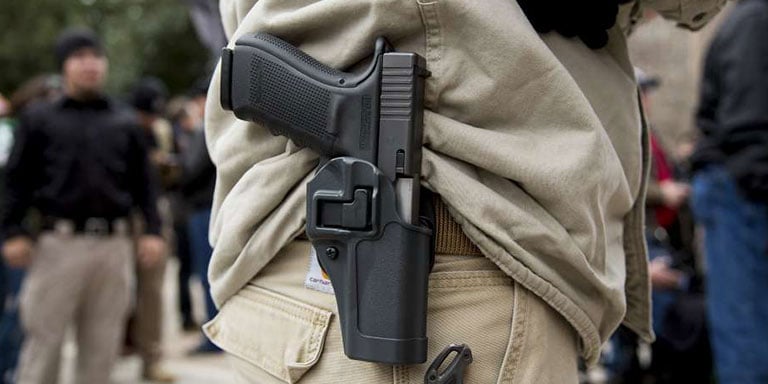Selecting the best firearm for personal protection is a serious decision that requires careful consideration of several factors, including legal considerations, personal needs, and proficiency level. Here we will guide you through these considerations, ensuring you make an informed choice that best suits your personal protection needs.

Legal Considerations
Before diving into the specifics of firearm selection, it’s paramount to understand and comply with the legal requirements in your area. Firearm ownership laws vary significantly by country, state, and even city, encompassing who can own a firearm, what types of firearms are legal, and how they can be carried (openly or concealed). Always consult local laws and regulations, and consider obtaining the necessary permits or licenses before making a purchase.
Personal Needs
Understanding your personal needs is crucial in selecting the right firearm for personal protection. Consider your living situation, daily routine, and the specific threats you might face. For instance, those living in rural areas might prioritize different features in a firearm compared to those in urban settings due to variances in threat distance and type.
Home Defense vs. Personal Carry
Deciding whether the firearm will be used primarily for home defense or personal carry influences the size, caliber, and type of firearm you might choose. Larger firearms, which are harder to conceal, may be more suitable for home defense, offering higher accuracy and capacity. Conversely, for personal carry, compact and subcompact firearms are preferred for their ease of concealment and comfort.
Understanding Firearm Types
There are three main types of firearms to consider for personal protection: handguns, shotguns, and rifles. Each has its own set of advantages and disadvantages.
- Handguns: Handguns, such as pistols and revolvers, are the most popular choice for personal defense due to their compact size, making them ideal for concealed carry. They require training to use effectively, especially under stress. The Beretta M9A3 is a notable example in this category, offering enhanced ergonomics and performance features.
- Shotguns: Shotguns are highly effective for home defense thanks to their stopping power and wide shot spread, reducing the need for precise aim. However, their size and recoil make them less suitable for all individuals.
- Rifles: Rifles, including carbines, offer high accuracy and range. While they can be used for home defense, their size and the high penetration of their rounds may not be ideal for all situations.
Caliber Considerations
The caliber of a firearm refers to the diameter of the barrel and, consequently, the size of the bullet that the firearm fires. Common calibers for personal protection include 9mm, .40 S&W, and .45 ACP for handguns, and 12 gauge for shotguns. Higher caliber firearms generally offer more stopping power but come with increased recoil, which can make them more challenging to shoot accurately, especially for less experienced shooters.
Ergonomics and Fit
A firearm should feel comfortable in your hand and suit your body type and strength. This includes being able to easily reach and operate the safety, magazine release, and other controls. A good fit enhances accuracy, confidence, and safety. It’s highly recommended to handle and, if possible, fire a firearm under supervision at a range before making a purchase.
Training and Proficiency
Owning a firearm for personal protection also comes with the responsibility of regular training and practice. Proficiency in handling, safety, and shooting accuracy is critical in effectively using a firearm in a high-stress situation. Consider enrolling in certified training courses that cover both the legal aspects of carrying a firearm for personal protection and practical shooting skills.
Maintenance and Reliability
The reliability of a firearm is crucial for personal protection. Regular maintenance is necessary to ensure your firearm functions correctly when needed. Some firearms are known for their reliability and low maintenance needs; researching and reading reviews can help you choose a model known for its dependability.
Conclusion:
Selecting the perfect firearm for personal protection is a multifaceted decision that should be approached with diligence and care. It requires understanding your personal needs, the legal environment, different types of firearms and their calibers, and the importance of ergonomics and fit. Remember, owning and carrying a firearm for personal protection also entails a commitment to regular training and practice to ensure safety and effectiveness. By carefully considering these factors, you can make an informed decision that enhances your personal safety and peace of mind.
